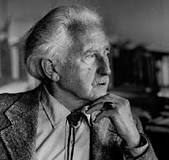
Erikson retired from the Harvard teaching faculty in 1970, but he hardly retired from writing. Although he did not complete any more long psychobiographies along the lines of the Luther and Gandhi books, he wrote thoughtful shorter works on Thomas Jefferson and on Jesus. With the full participation of his wife Joan, he continued to write about the later stages of the life cycle. Perhaps his most interesting treatment of the final stage, dealing with the crisis he called “ego integrity versus despair,” was a paper he had originally developed for his Harvard undergraduate course as a commentary on the Ingmar Bergman film Wild Strawberries. The film depicts an elderly Scandinavian professor’s review of his entire life cycle on the day he is to receive an honorary degree for his life’s work—no doubt a personally resonant film for Erikson, but also an excellent medium for him to communicate to young people what it means to look back on one’s life at its end and to assess whether it has been emotionally and morally rewarding or deeply disappointing.
Personality development, in Erik H. Erikson’s view, occurs through a series of identity crises that occur in stages that must be overcome and internalized. Erikson is best known for identifying eight stages of psychosocial development in the human life cycle and for his concept of the identity crisis. He expanded psychoanalytic theory to include the influence of cultural variations on individual ego development, and showed how personality development in certain key individuals can induce widespread cultural changes. For his book Gandhi’s Truth, he won a Pulitzer Prize and a National Book Award. By improving Sigmund Freud’s case-history research methods and extending their application beyond childhood to the entire life span, Erikson became the father of contemporary psychobiographical research.
“Erikson, Erik Homburger.” Complete Dictionary of Scientific Biography. 2008. Retrieved June 19, 2016 from Encyclopedia.com: http://www.encyclopedia.com/doc/1G2-2830905654.html

Erikson believed that personality developed in a series of stages and that in each stage we can have positive and negative experiences in which can shape our personality from infancy to adulthood
LikeLike
I agree with Erikson’s theory and the stages of psychological development (from child to adult) during which one’s personality develops. Social interaction can have either a negative or positive influence on one’s personality development.
LikeLike
I agree with Erik Erikson’s belief that cultural variations influence people’s lives and personalities.
LikeLike
i strongly agree with how Erickson believed that personality development continues throughout people’s lives and his idea of uniqueness
LikeLike
Erikson wrote many books and studied about child psychoanalysis (childhood traumatic events can influence their personality in the future) and how identity crises helps people develop their personality.
LikeLike
Erikson is known for identifying the 8 stages of the human cycle. He wanted to communicate with young people to realize how their life has treated them.
LikeLike
I enjoyed learning that Erickson continued writing of he life cycle and the interesting treatment of the final stage, with is wife as they got up there in age. He was also able to add to the psychoanalytical theory to include influence of cultural variations on individual ego development.
LikeLike
Erikson had based his studies on human life cycle and identity crisis, seeing how people who go through things can make an impact on the environment. Mainly known for the eight stages of psychosocial development.
LikeLike
I like Erickson’s theory as he included the eight stages of psychosocial development in the human life cycle.
LikeLike
Erik Erikson’s ideas mostly a theory concern with phycology with culture. The way culture influence and agree with certain beliefs. Also, he studied about how culture influences on psychological development.
LikeLike
read and understood. I agree with one of his views which is” personality development takes place through a series of identity crises”. it identifies us as a person afterwards .
LikeLike
I agree with his theory. Our sense of development accurs inside of each one, with identify crises on each cicle of the life. We understand ourselves and develop to be better.
LikeLike
Erikson’s theory had touched me personally. In this case I understand the theory should be apply to cheer up the best side of each individual. And give childrens the opportunity of independence.
LikeLike
I read and understood for the most part. My understanding is that he wanted young people to think about fulfillment in their lives and and in their final stages, gain the ability to feel rewarded and satisfied with their lives. Also, to understand the importance in overcoming identity crisis.
LikeLike
I think his theory is really intriguing because it does cover the entire life span. I can’t really have much of an opinion on his theory because I don’t have the fun of knowledge to negate it.
LikeLike
His theory was influenced by Freud’s theory only difference is that Erickson’s theory had more to do with culture and society from my understanding. His 8 stages of psychosocial development make a lot of sense.
LikeLike
I feel his theory of 8 stages makes a lot of sense.
LikeLike
Erikson was the founder of eight stage of psychosocial development in the human life cycle , his approach improved the case history of Sigmund Freud.
LikeLike
I like Erikson theory a lot by expanding psychoanalytic theory to include cultural variations, and also identifying the identifying eight stages of psychosocial development in the human life cycle.
LikeLike
Erik Erikson was the co founder of psychosocial development along with his wife. I actually like his theory and agree with the stages as negative and positive and how it can follow us through life like for Early adulthood 20–39 year olds Love Intimacy vs. Isolation I like how he identifies potential areas of ages and how if we are not well adjusted what will be impacted
LikeLike